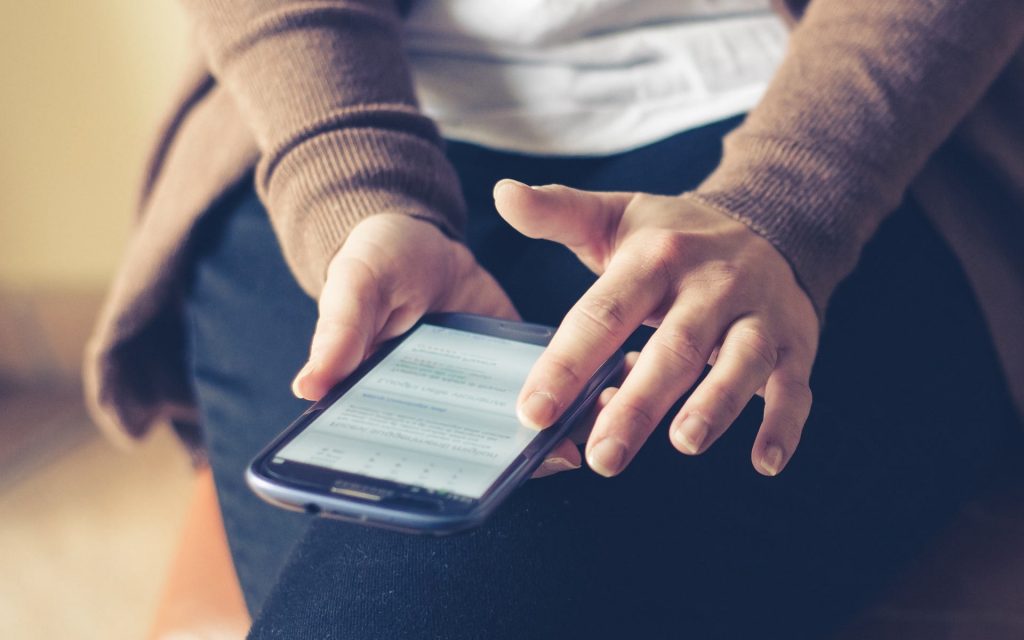5 tips to protect your privacy when using mental health apps (and 2 great apps I recommend)

In today’s mobile-oriented world, there is an app for almost anything and everything you need to get done, including apps to help you take care of your mental health. Mental health apps are increasingly popular as they break down the barrier of cost, accessibility, and stigma that can sometimes keep people from getting the support they need.
A few types of mental health apps you can find on the Google Play and Apple App store include apps for mindfulness, diary/journaling, yoga, meditation, mental health symptom management, psycho-education, medication trackers, and services that can connect you with live mental health professional.
While all these apps have the potential to be a great resource for people who are unable or more reluctant to access in-person care, or as an addition to in-person counselling, there are also potential dangers to look out for.
A 2018 study looked at the data security and privacy policies of mobile apps for depression and found that less than half of the apps reviewed had a privacy policy, including ones that collected highly personal information. A privacy policy is an important legal document that outlines how your information is collected, stored, used, and disposed (or not disposed) of.
Similarly, a 2015 study examined apps designed to help people with bipolar disorder and found that most did not provide guidance that was informed by current research or established self-management strategies. Many of the apps reviewed also failed to provide important information to help users assess the quality of the information provided, such as any references to research.
Downloader beware
While the Google Play and Apple App stores put considerable effort into preventing malware, software with malicious intentions, from being added to their stores, the process for evaluating the quality and effectiveness of available apps remains poor.
A recent prime example of this is the Living Hope app which promoted “conversation therapy”, the widely discredited and harmful practice of attempting to change one’s sexual orientation. The app was only removed after considerable advocacy and protest from concerned individuals and community groups.
Protect your mind and your privacy
Here are 5 tips to help you pick the best mental health apps to support your well-being, either on your own or in conjunction with in-person therapy, and help you avoid the apps that can potentially mess with your mind and your privacy:
1) Review the privacy policy (or whether one even exists)
Does the app require you to enter personal information to sign up, or ask you to enter sensitive information about your health?
If so, it’s even more important that you understand how that information is handled from the moment you sign up to the moment you uninstall it. Without a clear privacy policy, your private health information could end up anywhere, leaving you with little recourse. Also, use a “junk” email and avoid apps that ask too many questions unless you absolutely trust it.
2) Look for proof of quality
How do the app developers measure the effectiveness of their program or quality of their information? What do real users have to say?
It’s not uncommon for apps to have fake reviews or positive reviews with almost no information. Take a closer look for more in-depth positive and critical reviews on the app’s page, or even search for reviews on credible blogs.
3) Question the claims
Does the app maker provide references to research to back up their claims?
Be wary of apps that make bold claims like “eliminating” your anxiety or stress. There is no one strategy or treatment that works for everyone or for every problem.
Whether the app is based on up-to-date, innovative techniques, or tried and true self-management strategies, they have a responsibility to let users know where that information comes from.
4) Keep it fresh
Is the app regularly updated with new information and security features?
Many apps can exist in the stores for months or years with minimal or no updates. The developers are likely not maintaining the app anymore. You can check the date on to app’s page to see it was last updated.
5) Apps aren’t the best for everything
Could you be getting the similar type of information, program, or therapy in another format?
Books and workbooks (including eBooks) tend to have more references and dive deeper into complex topics. Many therapists, including myself, also offer convenient and secure online therapy, which you can access from the comfort of your home. Live conversations provide you a direct way to address any concerns about privacy and confidentiality.
Bonus! Two apps I recommend.
I’m always downloading and reviewing different mental health apps to recommend to clients. Here are two that I regularly use on my phone and suggest to anyone that asks.
MindShift (Free and available on Google Play and Apple iOS)

MindShift was created and is regularly maintained by Anxiety Canada. It’s very user friendly and based on Cognitive Behavioural Therapy (CBT), an effective form of therapy that can help users learn to relax, practice more effective ways of thinking, and take steps to better manage their anxiety.
Aware (Free, but more options available with paid membership. Available on Google Play and Apple iOS)

I have tried many secular mindfulness and meditation apps over the years and Aware is the most comprehensive and easy to use. The core program, which is an intro to the practice and benefits of mindfulness, is free to all users. The narrator’s voice is clear and calming. And there’s no new age down-tempo beats in the background (sorry to fans of the genre).
About the author: Tony is the owner and therapist with Quadra Wellness and Counselling. He helps people get back to the things that matter most to them. He is also an avid reader and has a keen interest in wearable technology, sleep science, and wellness.
References:
O’Loughlin, K., Neary, M., Adkins, E. C., & Schueller, S. M. (2018). Reviewing the data security and privacy policies of mobile apps for depression. Internet interventions, 15, 110–115. doi:10.1016/j.invent.2018.12.001
